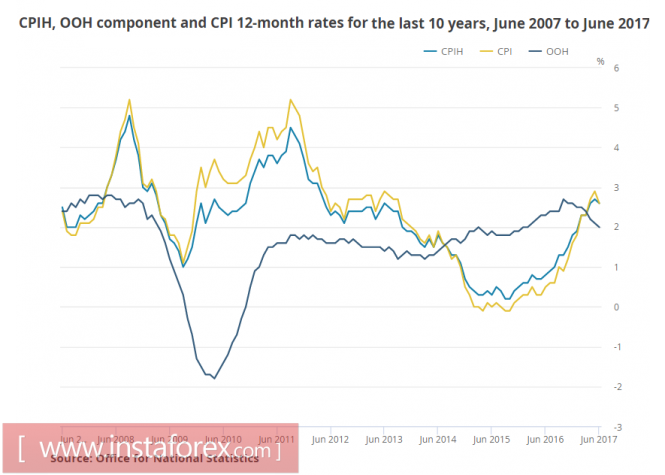Eurozone
Today, the ECB will hold a regular meeting on monetary policy, at the moment heightened uncertainty remains on its outcome.
In fact, the ECB has only one crucial reason for refining from completing the easing program.
Partial profit-taking before the meeting helped to reduce prices to 1.15, but the probability of resuming growth remains at a high level.
United Kingdom
The level of consumer inflation dropped for the first time since April 2016, but remains at a high level.

The British economy was much more resilient than forecasted despite Brexit, but signs of a slowdown in GDP growth are becoming clearer. Growth in the first quarter was only 0.2%, this is the worst result from all of the EU countries, while the second quarter was slightly better. The main reason is a drop in private consumption, the weak pound contributing to a rise in import prices, and a low nominal increase in average wages coupled with high inflation which led to real wages becoming negative for the first time since 2014.
Will the Bank of England decide to raise the rate under these conditions? There are arguments in favor of this decision. In particular, inflation is still higher and unemployment is lower than forecasted back in May. There is no unity among BoE officials. In particular, in June, three of the eight committee members voted for an immediate rate hike and Bank of England chief economist Andrew Haldane said he will likely join the hawks.
Thus, the pound remains highly uncertain. Large banks offer opposite scenarios. In particular, Commerzbank expects the decline of the GBPUSD to 1.2880. On the other hand, Lloyds expects a growth to 1.34. The mood of investors might depend on the report on retail sales in May, the forecasts of experts are optimistic, as the data can support the pound in the short term.
Oil and ruble
The reduction in commercial oil reserves by 4.7 million barrels, according to the API, has contributed to the growth in oil prices.
Oil provides support to the Russian currency. In addition, several factors contribute to the strengthening of the ruble. The Ministry of Finance announced that it does not intend to impede the growth of the ruble and will not raise the volume of currency purchases. In addition, a number of large companies will conduct tax and dividend payments in the coming weeks. The ruble under these conditions will strengthen and could reach 57 rubles per dollar in the beginning of next week.
The material has been provided by InstaForex Company - www.instaforex.com